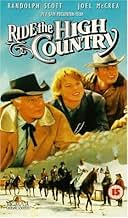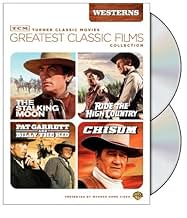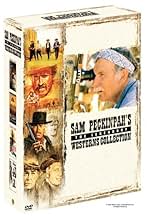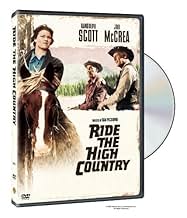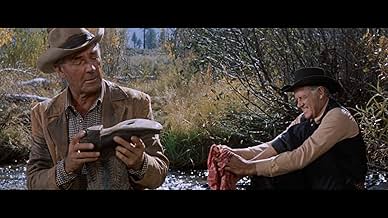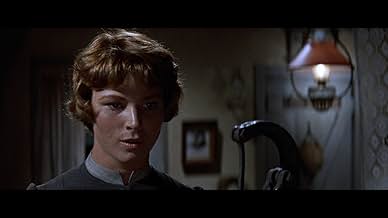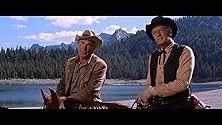IMDb-BEWERTUNG
7,4/10
15.653
IHRE BEWERTUNG
In diesem hervorragenden, bewegenden Film von Sam Peckinpah spielen die Cowboylegenden Randolph Scott und Joel McCrea Rollen, die ihnen auf den wettergegerbten Leib geschrieben sind...In diesem hervorragenden, bewegenden Film von Sam Peckinpah spielen die Cowboylegenden Randolph Scott und Joel McCrea Rollen, die ihnen auf den wettergegerbten Leib geschrieben sind...In diesem hervorragenden, bewegenden Film von Sam Peckinpah spielen die Cowboylegenden Randolph Scott und Joel McCrea Rollen, die ihnen auf den wettergegerbten Leib geschrieben sind...
- Regie
- Drehbuch
- Hauptbesetzung
- Nominiert für 1 BAFTA Award
- 2 Gewinne & 2 Nominierungen insgesamt
Alice Allyn
- Candy
- (Nicht genannt)
George Bell
- Townsman
- (Nicht genannt)
Oscar Blank
- Miner
- (Nicht genannt)
Chet Brandenburg
- Miner
- (Nicht genannt)
Don Brodie
- Spieler
- (Nicht genannt)
Chris Carter
- Rose
- (Nicht genannt)
Empfohlene Bewertungen
An above average Western featuring two of the genres most recognizable stars, Joel McCrea and Randolph Scott (in his last film). Both men have a history together as outlaws, but McCrea has gone straight and is now in charge of getting the gold from the mines to the bank. To help him, he hires his old friend Scott who, along with a young hothead (Ron Starr), is in town dressed up like "Buffalo Bill" and demonstrating his fancy shooting.
Scott believes he can persuade his old partner to split the gold with him before they return, and must act as a buffer between the impatient young ruffian and his old friend. While en route, the three encounter a religious farmer (R. G. Armstrong) and his under socialized daughter (Mariette Hartley), who steals away to join them.
The trouble really begins when they get to the remote mining town, encountering an inbred mountain family of hoodlums (which includes Warren Oates) and its judge (Edgar Buchanan).
Directed by Sam Peckinpah, and written by N.B. Stone Jr., it was added to the National Film Registry in 1992.
Scott believes he can persuade his old partner to split the gold with him before they return, and must act as a buffer between the impatient young ruffian and his old friend. While en route, the three encounter a religious farmer (R. G. Armstrong) and his under socialized daughter (Mariette Hartley), who steals away to join them.
The trouble really begins when they get to the remote mining town, encountering an inbred mountain family of hoodlums (which includes Warren Oates) and its judge (Edgar Buchanan).
Directed by Sam Peckinpah, and written by N.B. Stone Jr., it was added to the National Film Registry in 1992.
A Bank assigns to veteran with noble purposes named Steve Judd (Joel McCrea) a dangerous mission , guarding a gold shipment . He hires an old friend gunfighter named Gil Westrum (Randolph Scott in his last movie) alongside a young pal (Starr), the trio join forces against risks and enemies . In the journey pick up a beautiful girl named Elsa (Mariette Hartley in his first movie) , daughter of a tyrant (R.G.Armstrong) and puritan old man . Elsa goes to marry to Billy Hammond (James Drury) in a ceremony celebrated by a boozy judge (Edgar Buchanan) . But she flees and is pursued by Billy's brothers (John Anderson,Warren Oates,LQ Jones and James Davies Chandler) . Meanwhile , respectable Joel McCrea justly to make a correct job , is double-crossed by his partners .
The picture is based on an interesting novel titled ¨Guns in the afternoon¨ by W. Stone . It was shot in California where is developed the plot and occurs the Western events although in limited budget . Two old men , tough Scott and upright McCrea , similarly their veteran characters play with great feeling and lyricism . The movie contains flawless performances , adventure , shootouts , villainy , romance and heroism with a terrific climax final including a mortal duel . The picture is a poem about the twilight Western and results to be a prophecy on the Western genre's downfall . This classic story comes to life enriched in color magnificence , splendidly photographed in Widescreen Metrocolor by Lucien Ballard although at the Television set loses its splendor . Besides , an evocative Western musical score by George Bassman . The two protagonists decided to leave the cinema business , but they retired with an excellent film , though Joel McCrea starred some film more for his son Jody McCrea . The motion picture is magnificently directed by Sam Peckimpah , an expert director and writer.
Sam Peckimpah , after beginning his career as a writer , he was soon involved in TV Westerns . Filming popular Western as ¨Rifleman¨ , ¨Westener¨ , and ¨Gunsmoke¨ . Moving into pictures in 1961 giving fine impression with ¨Deadly companions¨ starred by Brian Keith and Mauren O'Hara . After that , he did the prestigious ¨Ride the high county¨ that along with ¨Wild Bunch¨ , at the peak of his popularity , remain Sam's best films . Later on , he made ¨Major Dundee¨ that was heavily re-cutting . He subsequently filmed tougher-than-tough action movies , including gushing blood and guts with particular images in slow-moving , such as : ¨The getaway¨ , ¨the killer elite¨, the most popular ¨Straw dogs¨ , Convoy¨, and ¨The Osterman weekend¨ , until his early death .
The picture is based on an interesting novel titled ¨Guns in the afternoon¨ by W. Stone . It was shot in California where is developed the plot and occurs the Western events although in limited budget . Two old men , tough Scott and upright McCrea , similarly their veteran characters play with great feeling and lyricism . The movie contains flawless performances , adventure , shootouts , villainy , romance and heroism with a terrific climax final including a mortal duel . The picture is a poem about the twilight Western and results to be a prophecy on the Western genre's downfall . This classic story comes to life enriched in color magnificence , splendidly photographed in Widescreen Metrocolor by Lucien Ballard although at the Television set loses its splendor . Besides , an evocative Western musical score by George Bassman . The two protagonists decided to leave the cinema business , but they retired with an excellent film , though Joel McCrea starred some film more for his son Jody McCrea . The motion picture is magnificently directed by Sam Peckimpah , an expert director and writer.
Sam Peckimpah , after beginning his career as a writer , he was soon involved in TV Westerns . Filming popular Western as ¨Rifleman¨ , ¨Westener¨ , and ¨Gunsmoke¨ . Moving into pictures in 1961 giving fine impression with ¨Deadly companions¨ starred by Brian Keith and Mauren O'Hara . After that , he did the prestigious ¨Ride the high county¨ that along with ¨Wild Bunch¨ , at the peak of his popularity , remain Sam's best films . Later on , he made ¨Major Dundee¨ that was heavily re-cutting . He subsequently filmed tougher-than-tough action movies , including gushing blood and guts with particular images in slow-moving , such as : ¨The getaway¨ , ¨the killer elite¨, the most popular ¨Straw dogs¨ , Convoy¨, and ¨The Osterman weekend¨ , until his early death .
It was goodbye to two stars from the golden age of Westerns and hello to a director who would help transform the genre into something bloodier, nastier, and truer. A skillful compromise of those visions, "Ride The High Country" presents a kind of crossroads that feels more like a destination, a perfect summing-up of the legend and the reality of the American West.
Steve Judd (Joel McCrea) is a weary old lawman trying to make ends meet as he nears the end of the road. To transport some gold from a mining town to a bank, he takes on the services of an old buddy, Gil Westrum (Randolph Scott). Westrum's as sleek and angling as Judd is square, and has more on his mind than collecting $10 a day risking his neck guarding someone else's money. While this remains unsettled, the pair gets mixed up with a woman (Mariette Hartley) who thinks she's in love with a miner whose idea of a honeymoon means sharing the wealth with his hideous brothers.
Ask anyone with a glancing knowledge of films what kind of movies Sam Peckinpah made, and they will likely describe a movie very different from this. There's some shooting, a little blood, and an unshaven Warren Oates, but otherwise "Ride The High Country" is a movie in the classic Western mold. There are some dissonances for Scott and McCrea's old-time fans to sort through, like Scott's ambiguous morality, but this is all-in-all the nicest movie Peckinpah ever made, decent characters set against an inspiring landscape, the kind of yarn John Ford or Anthony Mann would have delivered.
Not that everything is too black-and-white. The girl, having escaped her stern father and the stump farm where they lived, asks Judd at one point about right and wrong: "It isn't that simple, is it?" "No, it isn't," Judd replies. "It should be, but it isn't."
McCrea is the center of this film, a pillar of virtue. He quotes the Bible, but it's not clear he's especially religious or just stoic in the classic tradition. When he talks about his simple desire "to enter my house justified," he may have the Christian meaning in mind, or just the humanistic ideal of having been a good man when all is said and done. Nevertheless, there are intimations of a deeper truth in the redemption of Westrum and his unambiguous last line: "I'll see you later."
Peckinpah does present a bull-headed Christian zealot in R.G. Armstrong as the girl's father, but he's essentially decent, afraid of life, what it did to him and can do to her. Some see a suggestion of incest in their relationship, when she tells him he doesn't want her with any man but him, but it's more likely that's her complaining about his being overprotective.
There's a lot of humor here, too, much of it courtesy of Randolph Scott. Scott could be a stiff in other films; here he settles nicely into the role of a cut-up, like when he watches his young charge Heck get the tar beaten out of him twice without lifting a finger to help him. "Good fight, I enjoyed it," Westrum chirps as the boy licks his wounds.
The film culminates in a good fight with the Hammonds, so ornery they jeer at Heck when he brings the girl to their doorstep and she assures them he was a gentleman: "How come? Something wrong with him?" It's the one gunfight in the film, and though its one more than some Peckinpah films like "Junior Bonner" had, it's another reason for the film sticking out as unusual in the director's oeuvre.
But it's a good kind of difference, for the most part, as Peckinpah finds his métier while paying tribute to those who came before him with the help of McCrea and Scott. Like its heroes, "Ride The High Country" moves a little slowly in parts, but watching it, you'll likely agree with me the long journey is worth the ride.
Steve Judd (Joel McCrea) is a weary old lawman trying to make ends meet as he nears the end of the road. To transport some gold from a mining town to a bank, he takes on the services of an old buddy, Gil Westrum (Randolph Scott). Westrum's as sleek and angling as Judd is square, and has more on his mind than collecting $10 a day risking his neck guarding someone else's money. While this remains unsettled, the pair gets mixed up with a woman (Mariette Hartley) who thinks she's in love with a miner whose idea of a honeymoon means sharing the wealth with his hideous brothers.
Ask anyone with a glancing knowledge of films what kind of movies Sam Peckinpah made, and they will likely describe a movie very different from this. There's some shooting, a little blood, and an unshaven Warren Oates, but otherwise "Ride The High Country" is a movie in the classic Western mold. There are some dissonances for Scott and McCrea's old-time fans to sort through, like Scott's ambiguous morality, but this is all-in-all the nicest movie Peckinpah ever made, decent characters set against an inspiring landscape, the kind of yarn John Ford or Anthony Mann would have delivered.
Not that everything is too black-and-white. The girl, having escaped her stern father and the stump farm where they lived, asks Judd at one point about right and wrong: "It isn't that simple, is it?" "No, it isn't," Judd replies. "It should be, but it isn't."
McCrea is the center of this film, a pillar of virtue. He quotes the Bible, but it's not clear he's especially religious or just stoic in the classic tradition. When he talks about his simple desire "to enter my house justified," he may have the Christian meaning in mind, or just the humanistic ideal of having been a good man when all is said and done. Nevertheless, there are intimations of a deeper truth in the redemption of Westrum and his unambiguous last line: "I'll see you later."
Peckinpah does present a bull-headed Christian zealot in R.G. Armstrong as the girl's father, but he's essentially decent, afraid of life, what it did to him and can do to her. Some see a suggestion of incest in their relationship, when she tells him he doesn't want her with any man but him, but it's more likely that's her complaining about his being overprotective.
There's a lot of humor here, too, much of it courtesy of Randolph Scott. Scott could be a stiff in other films; here he settles nicely into the role of a cut-up, like when he watches his young charge Heck get the tar beaten out of him twice without lifting a finger to help him. "Good fight, I enjoyed it," Westrum chirps as the boy licks his wounds.
The film culminates in a good fight with the Hammonds, so ornery they jeer at Heck when he brings the girl to their doorstep and she assures them he was a gentleman: "How come? Something wrong with him?" It's the one gunfight in the film, and though its one more than some Peckinpah films like "Junior Bonner" had, it's another reason for the film sticking out as unusual in the director's oeuvre.
But it's a good kind of difference, for the most part, as Peckinpah finds his métier while paying tribute to those who came before him with the help of McCrea and Scott. Like its heroes, "Ride The High Country" moves a little slowly in parts, but watching it, you'll likely agree with me the long journey is worth the ride.
Randolph Scott and Joel McCrea will probably be remembered as the top "B" western stars in movies. But their last film "Ride the High Country" stands as an "A" western and a very good one too.
Perhaps they owe this final chance to director Sam Peckinpah who turns the story into a splendid film in its genre shot in beautiful outdoor sceneries, with very well managed action scenes, a credible script, great settings and a fine musical score too.
Two moments are particularly outstanding in my opinion: the sort of "Fellinesc" sequence at the wedding with all those bizarre characters and the final showdown where Scott and McCrea face the mean Hammond brothers (John Anderson, James Drury and Warren Oates) in the "old fashioned way".
A well deserved "A" product for both actors -that amused and thrilled us western fans- through their long careers in the genre.
Perhaps they owe this final chance to director Sam Peckinpah who turns the story into a splendid film in its genre shot in beautiful outdoor sceneries, with very well managed action scenes, a credible script, great settings and a fine musical score too.
Two moments are particularly outstanding in my opinion: the sort of "Fellinesc" sequence at the wedding with all those bizarre characters and the final showdown where Scott and McCrea face the mean Hammond brothers (John Anderson, James Drury and Warren Oates) in the "old fashioned way".
A well deserved "A" product for both actors -that amused and thrilled us western fans- through their long careers in the genre.
RIDE THE HIGH COUNTRY proves that the Old West was a dangerous place for anyone willing to transport gold from a mining town to a bank with a couple of double-crossing cronies as companions and a runaway girl to protect.
JOEL McCREA and RANDOLPH SCOTT are the willing participants, a lawman and his corrupt pal, and MARIETTE HARTLEY is the girl who wants to escape the clutches of a cruel father and marry Billy Hammond (JAMES DRURY). She joins Scott and McCrea but doesn't realize what she's in for when she meets up with her ornery fiancé and his psychotic brothers, one of whom is played by WARREN OATES. She also has to contend with the advances of Scott's young pal, RON STARR, who doesn't want to see her get mixed up with Drury and his brothers.
The plot stays focused on these characters, moves slowly and is photographed with finesse by Lucien Ballard who filmed it in CinemaScope and Metrocolor in some gorgeous natural settings. It's a character-driven tale that has a moral compass but never becomes too preachy in the telling.
First-rate performances by McCrea and Scott hold the film together with the others being competent enough to stand inspection. The big mystery to me is: What happened to Ron Starr? He was certainly adequate enough and seemed to grow in the role as the film progressed, looking somewhat like a young Glenn Campbell. His bio at IMDb is very incomplete, so there's no telling what actually happened to him.
Summing up: Sturdy western with downbeat ending is interesting all the way through.
JOEL McCREA and RANDOLPH SCOTT are the willing participants, a lawman and his corrupt pal, and MARIETTE HARTLEY is the girl who wants to escape the clutches of a cruel father and marry Billy Hammond (JAMES DRURY). She joins Scott and McCrea but doesn't realize what she's in for when she meets up with her ornery fiancé and his psychotic brothers, one of whom is played by WARREN OATES. She also has to contend with the advances of Scott's young pal, RON STARR, who doesn't want to see her get mixed up with Drury and his brothers.
The plot stays focused on these characters, moves slowly and is photographed with finesse by Lucien Ballard who filmed it in CinemaScope and Metrocolor in some gorgeous natural settings. It's a character-driven tale that has a moral compass but never becomes too preachy in the telling.
First-rate performances by McCrea and Scott hold the film together with the others being competent enough to stand inspection. The big mystery to me is: What happened to Ron Starr? He was certainly adequate enough and seemed to grow in the role as the film progressed, looking somewhat like a young Glenn Campbell. His bio at IMDb is very incomplete, so there's no telling what actually happened to him.
Summing up: Sturdy western with downbeat ending is interesting all the way through.
Wusstest du schon
- WissenswertesFinal film of Randolph Scott. He retired from acting once he saw the finished film, saying he wanted to quit while he was ahead and that he would never be able to better his work here.
- PatzerThe many 34-star flags, all on flagpoles, at the opening of the movie do not match the Bobby helmets, open automobiles and electric wiring over the streets. The 34-star U.S. flag was in use only from 1861-1863. There is, however, also an inconsistent 45-star flag strung across the street. That design, in use from 1896-1908, does match the movie's time setting.
- Zitate
Steve Judd: All I want is to enter my house justified.
- Crazy CreditsIntroducing Mariette Hartley
- VerbindungenFeatured in Amerika im Film (1976)
Top-Auswahl
Melde dich zum Bewerten an und greife auf die Watchlist für personalisierte Empfehlungen zu.
Details
- Erscheinungsdatum
- Herkunftsland
- Sprachen
- Auch bekannt als
- Pistoleros al atardecer
- Drehorte
- Mammoth Lakes, Kalifornien, USA(Twin Lake, Horseshoe Lake)
- Produktionsfirma
- Weitere beteiligte Unternehmen bei IMDbPro anzeigen
Box Office
- Budget
- 813.000 $ (geschätzt)
- Laufzeit
- 1 Std. 34 Min.(94 min)
- Farbe
- Seitenverhältnis
- 2.35 : 1
Zu dieser Seite beitragen
Bearbeitung vorschlagen oder fehlenden Inhalt hinzufügen


